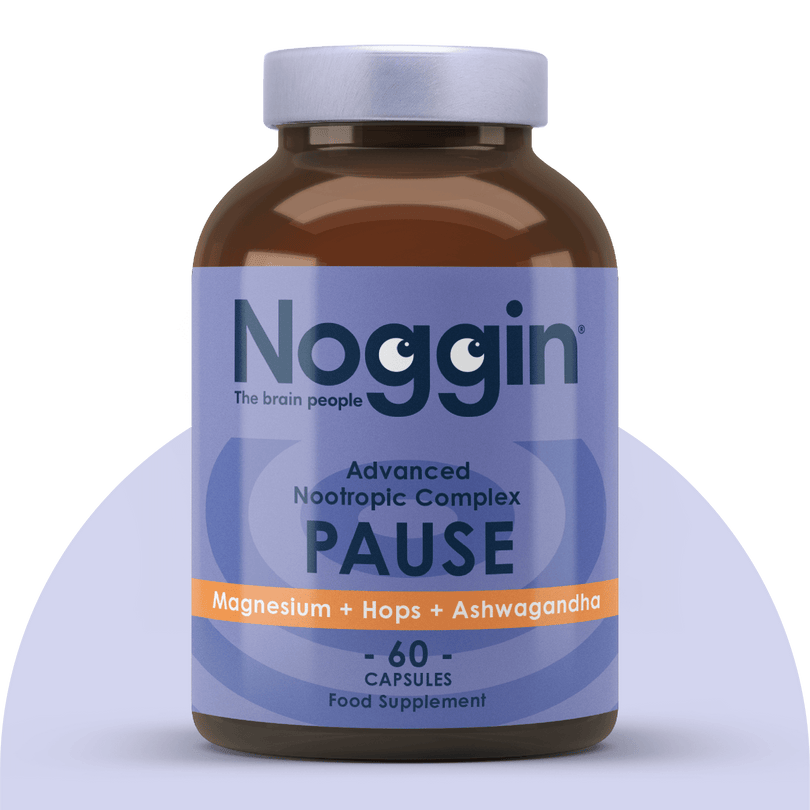As we go through menopause, did you know that the impact of this phase of our lives isn't just on our body - our brain is affected, too? The hormonal fluctuations during this time significantly impact our brain chemistry and can contribute to issues that affect our mental wellbeing, such as anxiety, depression, overwhelm, brain fog, and memory loss.
For many of us, this shift in our noggin can contribute to a feeling of losing control or aren’t quite ourselves, so it's helpful to understand how these changes are often tied to the hormonal imbalance that we go through during menopause.
Let's take a closer look to understand our noggin during menopause:
A hormonal rollercoaster
During perimenopause, our ovaries gradually produce less oestrogen and progesterone, two key hormones that play a central role in regulating not only our reproductive system but also our brain chemistry. These fluctuations can lead to a variety of emotional and cognitive symptoms, as the brain is highly sensitive to changes in hormone levels.
Oestrogen, for example, has a direct impact on the production of serotonin, a neurotransmitter that helps regulate mood. Lower oestrogen levels can lead to reduced serotonin activity, which in turn can contribute to feelings of sadness, irritability, and even depression. Similarly, progesterone, which has a calming effect on the brain, tends to drop during perimenopause, leaving us more susceptible to anxiety and feelings of overwhelm.
These hormonal imbalances can also affect other brain chemicals such as dopamine and GABA, both of which influence our ability to cope with stress, experience pleasure, and maintain focus.
Why do we experience anxiety, depression, and overwhelm during this phase?
For many of us, the period of perimenopause brings a heightened sense of anxiety or increased vulnerability to stress, and it can manifest in surprising ways - perhaps you suddenly start to experience panic at work over your workload that was previously manageable, or you feel overwhelmed when driving, or maybe you feel low and can't shake the feeling?
This is partly due to the reduced levels of progesterone, which is known for its calming and sleep-promoting effects. When we experience a decline in this hormone, we can feel on edge, restless or even overwhelmed by everyday challenges that we've managed without issue before.
Depression during perimenopause is more common than we might think - in fact, 1 in 10 of us may experience it during menopause, especially when the hormonal changes are combined with other life stresses. Our brain’s reduced ability to regulate mood, due to lower serotonin levels, can make us feel low, disconnected, or lacking in motivation. In some cases, we may even find it difficult to enjoy activities that once brought us joy, further exacerbating feelings of sadness or hopelessness.
Brain fog and cognitive function during menopause
It’s not just our mood that’s affected during perimenopause—many of us experience cognitive changes too. Brain fog, characterised by a feeling of mental cloudiness or lack of clarity, is a common complaint during this stage of life. This can make it difficult to concentrate, make decisions, or even remember things that are usually second nature to us. These cognitive challenges can be frustrating, disorienting, and can contribute to feelings of inadequacy or frustration.
Memory loss is another issue that many of us face during perimenopause. The decline in oestrogen can affect the hippocampus, the brain’s memory centre, making it harder to retain and recall information. We may find ourselves forgetting important dates, losing our train of thought mid-sentence, or struggling to remember things we would normally have no trouble recalling.
The combined effect of these mental health and cognitive changes can lead to a vicious cycle: the more overwhelmed we feel by our mental fog or memory lapses, the more stressed and anxious we become, which in turn further disrupts our brain chemistry.
Can we do anything to restore balance for our mental wellbeing?
The good news is that there are several ways to improve our hormone balance during perimenopause and support our mental health. Here are a few steps we can take to help bring more balance to our lives:
1. Nutrition and Lifestyle Choices
A healthy diet rich in whole foods, such as fruits, vegetables, lean proteins, and healthy fats, can help support hormone balance. Omega-3 fatty acids, found in fish and flaxseed, are particularly beneficial for brain health. Reducing processed foods, sugar, and caffeine can also help minimise mood swings and anxiety - and ensuring that you are moving your body regularly helps too. Gentle exercise, such as walking, yoga, or strength training, can boost both hormone production and mental wellbeing as it helps to release endorphins, which improve mood, and also aids in regulating oestrogen levels.
2. Stress Management
Stress exacerbates hormonal imbalances, so learning to manage stress is important. Mindfulness, deep breathing exercises, or meditation can help to manage anxiety. Taking time for yourself, such as journaling, a warm bath, or simply getting outside for a walk, can also make a significant difference to how we feel.
3. Better Sleep
Good quality sleep is more important than we realise for hormonal balance and mental health. As our progesterone levels drop, sleep can be elusive - and if you are waking frequently, or experiencing insomnia you'll know this only too well.
Try establishing a relaxing bedtime routine, avoiding screens in the hour before bed, and creating a calm, dark sleep environment. If you continue to struggle to sleep, speak to your GP for further treatment.






